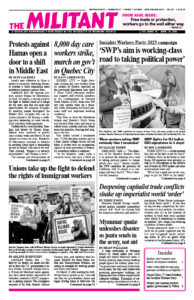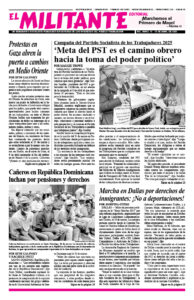As capitalism was displacing feudal rule, Karl Marx, the founder of the communist movement, delivered a “Speech on the Question of Free Trade” in Brussels in 1848.
It’s invaluable for understanding why working people need to break from the capitalist class on the question of trade — as on all other questions — and chart a course to defend the independent class interests of working people and of all humanity. Along that road, it’s possible for workers to take political power into our own hands.
The rise of monopoly and imperialism at the turn of the 20th century marked the end of any remaining progressive character of capitalism. Conflicts inherent to capitalist competition became more virulent, intense and deadly, leading to the unthinkable horrors of two imperialist world wars, underscoring the decisive importance of what Marx laid out.
Below are excerpts from his speech. It can be found in its entirety in Volume 6 of the Collected Works of Marx and Engels.
***
The most favorable condition for the workingman is the growth of capital. This must be admitted: when capital remains stationary, commerce and manufacture are not merely stationary but decline, and in this case the workman is the first victim. He goes to the wall before the capitalist.
And in the case of the growth of capital, under the circumstances, which, as we have said, are the best for the workingman, what will be his lot? He will go to the wall just the same. …
Do not imagine, gentlemen, that in criticising freedom of commerce we have the least intention of defending Protection.
One may be opposed to constitutionalism without being in favor of absolutism.
Moreover, the Protective system is nothing but a means of establishing manufacture upon a large scale in any given country, that is to say, of making it dependent upon the market of the world; and from the moment that dependence upon the market of the world is established, there is more or less dependence upon Free Trade too. Besides this, the Protective system helps to develop free competition within a nation. …
But, generally speaking, the Protective system in these days is conservative, while the Free Trade system works destructively. It breaks up old nationalities and carries antagonism of proletariat and bourgeoisie to the uttermost point. In a word, the Free Trade system hastens the Social Revolution. In this revolutionary sense alone, gentlemen, I am in favor of Free Trade.

